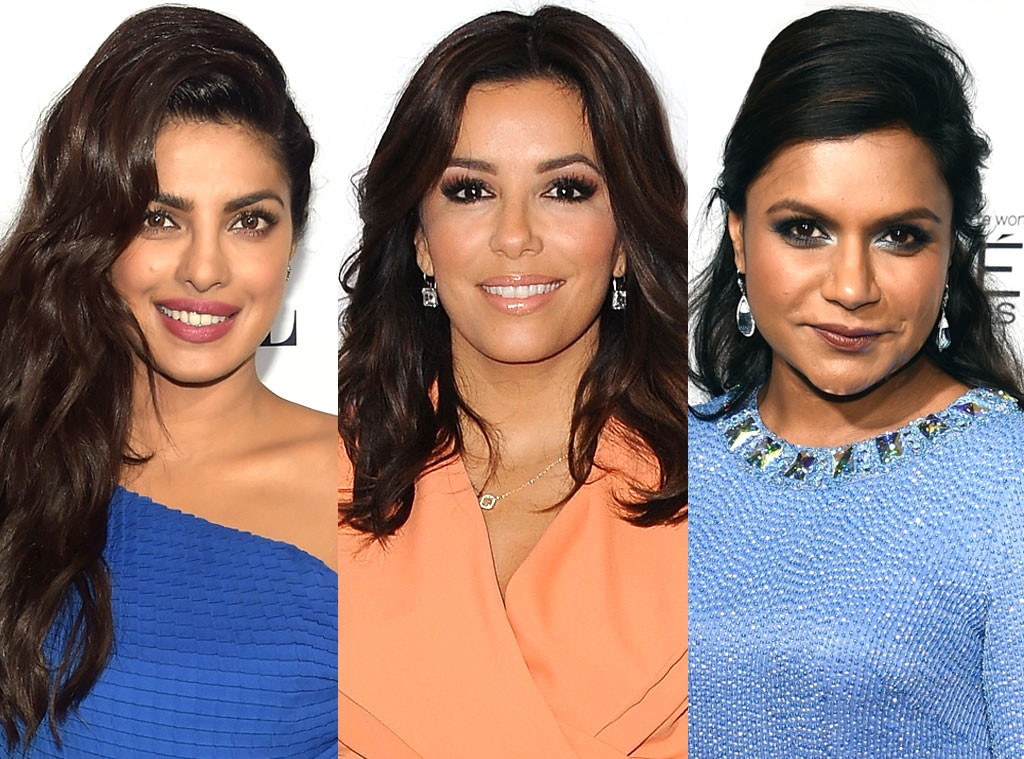 Getty Images
Getty ImagesWith the 2016 Oscars approaching this weekend and the controversy surrounding the all-white nominees still being a major point of discussion, several actresses are speaking out about what it's like being a non-white, non-male face in the industry.
Eva Longoria, Mindy Kaling, Priyanka Chopra and America Ferrera—to name a few—have all faced some sort of backlash or criticism due to the color of their skin, opening up to The New York Times about how they've overcome such obstacles.
"I didn't speak Spanish [growing up]. I'm ninth generation," Longoria explained. "I mean, I'm as American as apple pie...But I remember moving to L.A. and auditioning and not being Latin enough for certain roles."
She continued, "Some white male casting director was dictating what it meant to be Latin. He decided I needed an accent. He decided I should [have] darker-colored skin. The gatekeepers are not usually people of color, so they don't understand you should be looking for way more colors of the rainbow within that one ethnicity."
Ferrera had a similar experience and went as far as dying her hair blonde to try to land a role.
"I was 18 and putting myself on tape for a movie I really wanted. I got that phone call: They cast a Latino male in another role in the film; they're not looking to cast [a Latina]. So I defiantly bleached my hair blond, painted my face white and made the audition tape."
Nonetheless, she never heard back from them. "I just remember feeling so powerless. What do you do when someone says, 'Your color skin is not what we're looking for'?"
Kaling felt a similar heartbreak when she was denied the role in a pilot for a character she created.
"They were trying to audition my part, which I wanted to play, and at first they [looked for] Indian-American actresses, and when they couldn't find any, they opened up to more generically Middle Eastern actresses," she recalled to the Times. "Still couldn't find any, until at the end, they're like, 'We'll look for a white woman.'"
She explained, "That was heartbreaking for so many reasons. I auditioned. I think they were looking for someone more traditionally beautiful, because I'd like to think I gave a good audition, to play the part I created."
However, despite all of these obstacles, each woman says they now feel like they're in a place where they can use their platform as a means to spreading awareness about the diversity issue.
Kaling said it perfectly: "My role is not just artist. It's also activist because of the way I look. On so many shows and movies, race was a gesture, and in [The Mindy Project] it's the premise."
She added, "I can't ignore that what a lot of people see is an Indian woman who doesn't look like a Bollywood star. It piques their interest, and they're not bad for wanting me to tell stories about it, and I'm not wrong for not wanting to. I want to fill my desire to write vibrant, flawed characters, but then also be a role model to young people."
Chopra has also experienced a similarly positive breakthrough, recalling a moment in which a fan thanked her for giving diverse women a voice.
"I do feel extremely proud when I have people of the South Asian community coming up to me and saying, 'Thankfully we're seeing a non-stereotyped Indian.' At an event, I remember this girl hugged me and started crying. She said, 'Thank you for making us relevant.'"
She noted, "It gives me goosebumps every time I think about it"
For more from the stars' interviews, read the full NY Times article here.